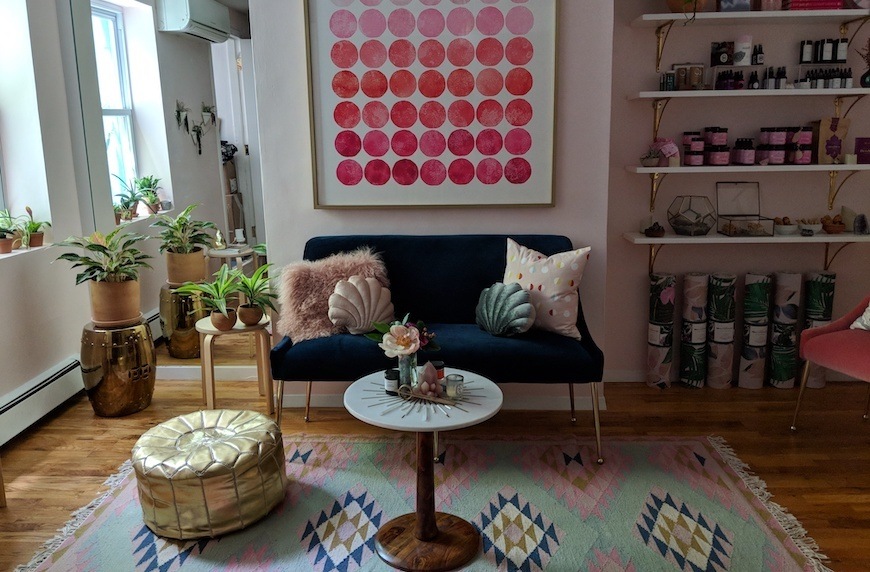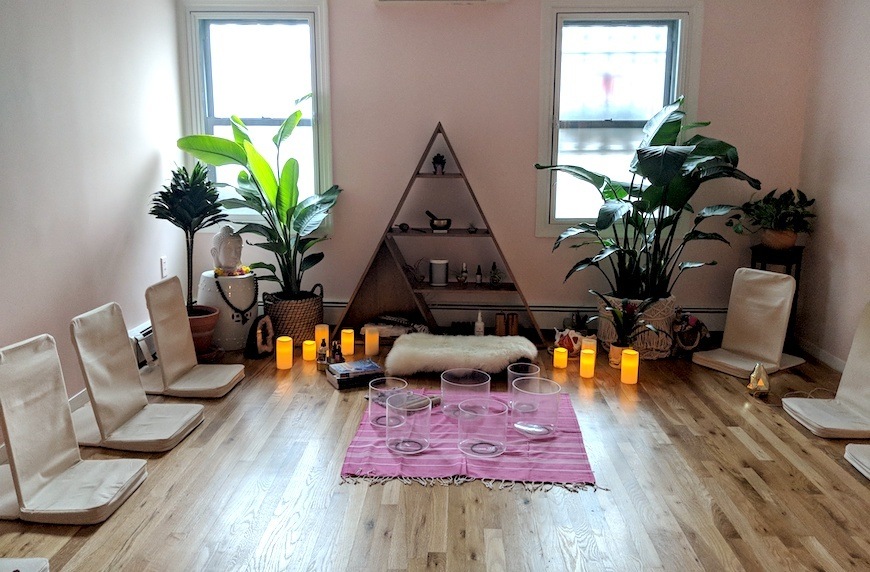A Doula Practice Grows in Brooklyn, but Its Founder Isn’t Stopping There
Upon entering, it feels like you're stepping into a friend's living room. The light, airy rooms, decorated with colorful throw pillows, comfortable chairs, and West Elm-esque rugs, feel like miles away from the loud street on the other side of the door. (The secret: sound-proofed windows and doors.) The friendly seating area leads into another, larger room stocked with candles and meditative cushions. This is where Thomas says yoga classes, meditation sessions, and a doula immersion training takes place. (There's also a fridge stocked with kombucha, because of course there is.) It's a place that feels inviting, warm, and comfortable—which was exactly the point, Thomas tells me.
"I’m so moved by community," Thomas says. It's a topic she circles back to again and again during our conversation—and something she sees as the heart of what it means to be a doula—a person hired to support and assist an expectant mother throughout pregnancy, childbirth, and early postnatal care. Modern childrearing is isolating, she says, far removed from our collective roots of "it takes a village" to properly raise a child. "Before, we were not just with one person, or one person supporting us. There were multiple people who would support women through these processes, and they were all part of their communities, so they never had to feel alone," she says.

Thomas' own interest in becoming a doula came from the positive experience she had delivering her son in 2003. Instead of giving birth in a hospital, she chose to deliver at the Elizabeth Seton Child-Rearing Center (formerly located in Manhattan, it moved to Westchester in 2012). "It was an amazing and empowering place," she recalls. She says that she was in charge of a lot of her own health care when she was there—at every checkup, she said, she'd weigh herself, complete her own urine tests, and write down that information in her own chart. The center also required 21 hours of education, she says, "so that you were really comfortable and understood the [childbirth] process." Thomas says the center and the midwives she worked with allowed her to have agency over the entire pregnancy process—including her birth. It felt spiritual and empowering, she says, not fearful.
After her son was born, Thomas immediately thought, "I have to protect this process for women," she recalls. She wanted more women to have the kind of positive experience that she had, which she felt is often lacking within the traditional health care system. (Thomas is not against doctors; she says all doulas and midwives are fully prepared for any outcome of a birth, including taking a patient to the hospital for an emergency C-section. "I’m always open to doing whatever the mother is comfortable with," she says, which sometimes means supporting a person's desire or need for a hospital birth.) Thus the seeds for Mama Glow, Thomas' maternity and lifestyle company, were planted.

{{post.sponsorText}}
For Thomas, the main purpose of being a doula is to ensure that every mother-to-be has an empowering birthing experience that fits their unique needs and desires. Mama Glow, which has been in operation since 2011, serves this mission a few ways. "We provide educational support, emotional support, physical support, advocacy, as well as mental health support" for expectant mothers, she says. "It's about assessing what the needs are, what's going on in the home, what their work environment is like."
This also includes advocating for the mother and teaching her to advocate for herself. Thomas says she educates clients about any misconceptions or fears they have about their bodies or about birth, and talks to them about things that might come up at every point in the birthing process that can be tricky to navigate (from doctor's appointments to whether or not a person wants to give birth at home). "I want people to feel like they have the tools," Thomas says. "It’s advocacy in the moment when we’re in these spaces where women need an extra voice alongside their voice." And that, she says, leads to better maternal outcomes—better mental health, and better physical health for both mom and baby.
She also works to understand an expectant mothers' past experience because that can affect their birthing experience. This includes someone having a baby after years of fertility struggles or other trauma, or someone with conflicting feelings about motherhood. "People come with their different stages, so it’s meeting them there, providing them with resources, and making sure that we can normalize what’s happening and let them know that there are other people in this," Thomas says.
"Being a woman is so political. If you look at everything that has to do with our body, it’s under legislative attack. We have to come in with businesses like ours to make sure we fill the policy gaps and we make sure that women feel the support." —Latham Thomas, founder, Mama Glow
And Mama Glow's support goes far beyond the birth plan to cover postpartum adjustment, feeding plans for a mom's new baby and for themselves, and even mobility issues (i.e. how are they going to get themselves and the baby around? Subway? Car?). It also offers lifestyle services to all women through yoga and life coaching.
Most importantly to Thomas (who is a doula), Mama Glow trains other women to be doulas through immersion programs at the company's two New York City locations and in other cities across the U.S. and internationally. When we spoke, Thomas was about to head off to Los Angeles and then Paris to teach a series of doula immersion courses. (The next beginner-level course is in July in New York City.)
Because for Thomas, the role of a doula is bigger than helping an individual client; she believes doulas inherently address larger societal issues that affect all expectant mothers. "Being a woman is so political. If you look at everything that has to do with our body, it’s under legislative attack. We have to come in with businesses like ours to make sure we fill the policy gaps and we make sure that women feel the support," she says. "Even though there isn’t a federally mandated maternity leave, how can we best prepare moms that have to go back to work? How can we make sure that women of all backgrounds have access to doulas?"

Thomas rattles off disturbing statistics on maternal mortality that she clearly knows by heart—that black women are 12 times more likely than white women to die during childbirth in New York City; that the national average is three times as likely, according to the most recent CDC statistics. She sees these numbers as a call to action to train more doulas "to help level the playing field" of access. "For us, it’s a commitment to make sure there’s more doulas out there and they’re more accessible but also affordable," Thomas says. "That’s what our commitment has been—to [fill] some of the holes in the system through our practice and make sure women feel hand-holding their entire journey, like I felt hand-holding."
Thomas doesn't just want to expand access to doula services—she wants to expand access to doula training, too. Mama Glow offers a payment plan to ensure that a wide variety of people can afford to participate in the $625+ training, and a scholarship for people coming back to the secondary level of the immersion course, she says. To apply for the scholarship, she says a person has to identify with a marginalized group, has to be doing work within their community, and demonstrates a commitment to bringing doula knowledge and work to their community. A person doesn't specifically have to have a health background to apply. "We've seen people who are like, I'm doing work in criminal justice, I'm doing work in prison reform," Thomas says. "To me, if you're doing the work, and you want to bring this in, we're happy to support your continuing education." In her view, investing in these dedicated people sends them back out into their communities, which may not be well-served by hospitals, to help educate women and save their lives.
None of this, however, means working completely separate from the traditional medical system. "I would rather infiltrate those systems with new thinking and actually touch the people who are going to change the system in the future," Thomas says. She says she teaches first and second year med school students at New York Presbyterian-Weill Cornell Medical Center about the experiences of women during childbirth, as well as about potential biases doctors can have that can interfere with patients' care, from race to age and marital status. "I’m not going to be able to change the hospital, but what I can do is change the people in the hospital so we create a new culture...That’s part of building the future," she says.
At the end of the day, Thomas sees herself and her fellow doulas on a mission to create a new, woman-centric community focused on compassionate, informed care throughout all stages of a person's life. "We have hundreds of doulas around the world and for me, to be a mother or aunt figure to all these women of all ages, it's awesome to be able to watch them grow in their practices but also to refer them to people," she says. "I want [women] to have better than what I had."
Read more from Latham Thomas here. And experts explain why fertility isn't just about genetics.
Loading More Posts...